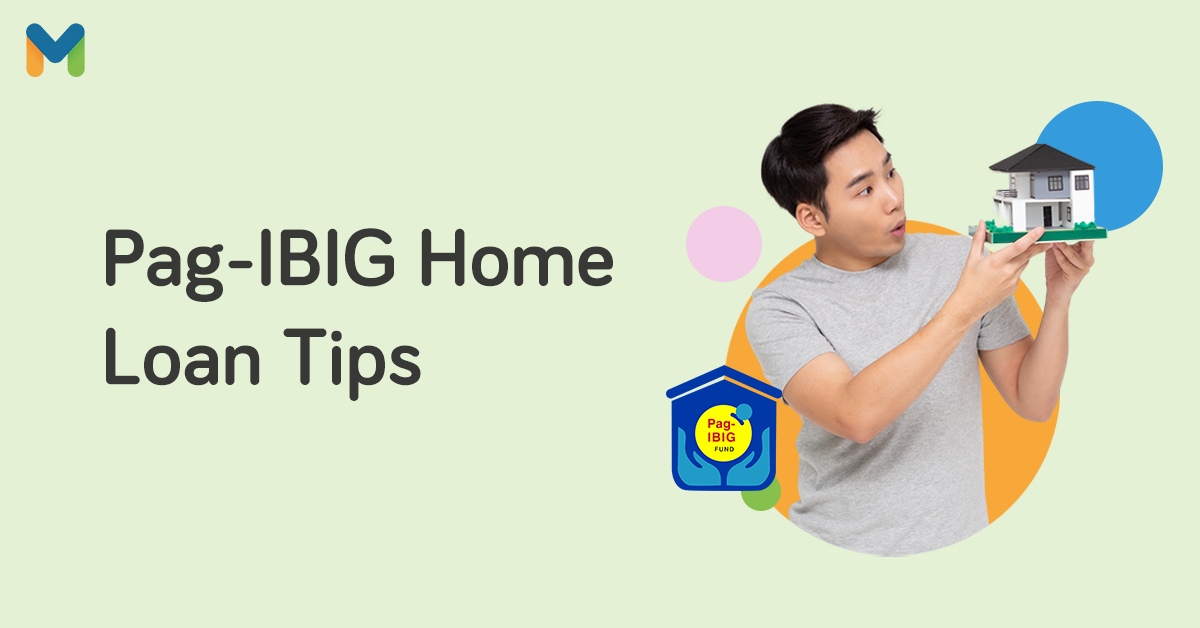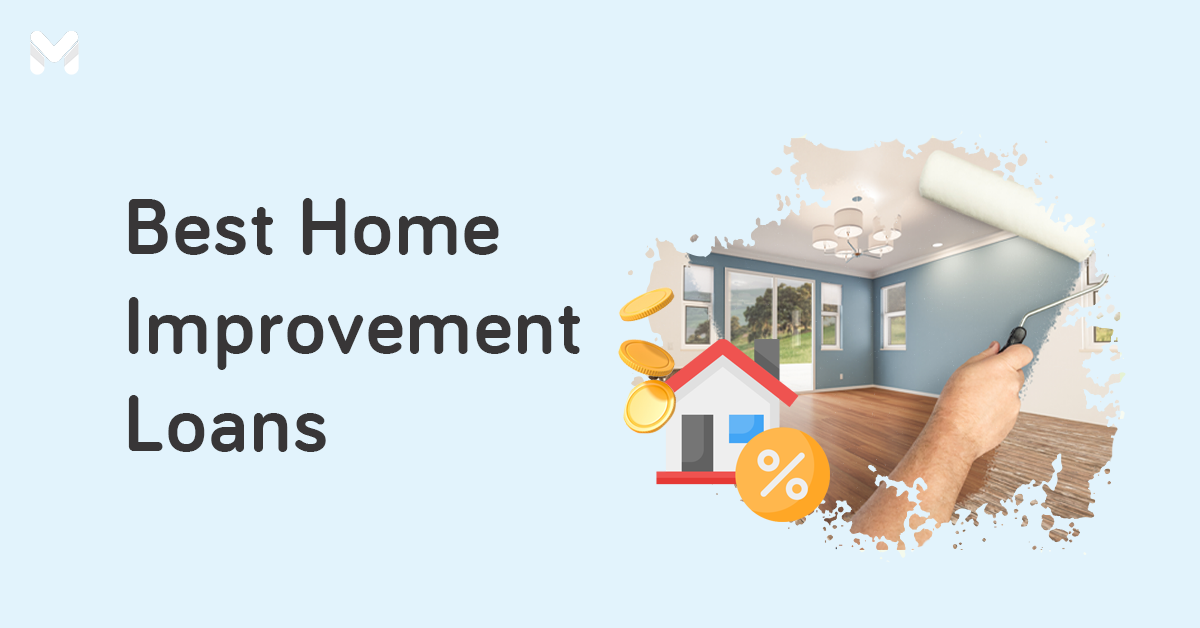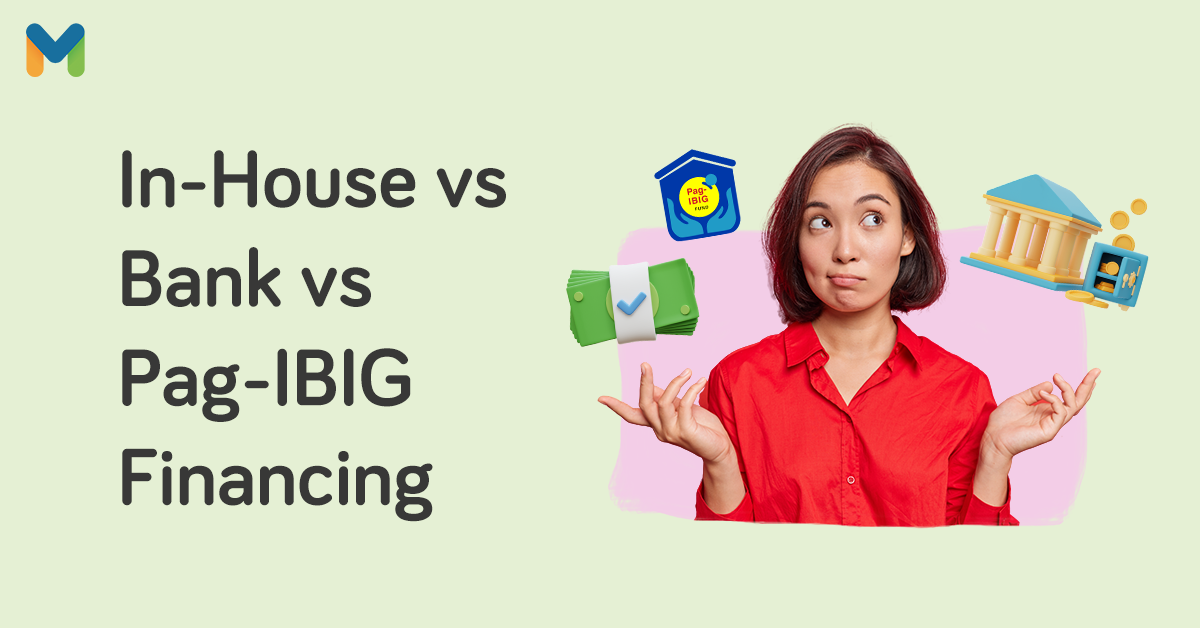Many Filipinos dream about having their own home. However, buying a house or property in the Philippines can be expensive.
This is why plenty of Filipinos turn to housing loans. In fact, according to preliminary data from the Bangko Sentral ng Pilipinas, lending for real estate activities rose by 3.5% in January 2023.[1]
Despite the rising prices of properties, higher interest rates, and increased borrowing and funding costs, you can still buy your dream home with a loan for a house in the Philippines.
What is a Housing Loan?
A housing loan is a financing facility that provides funds for the following:
- Acquisition of a fully developed lot
- Purchase of a residential house and lot, townhouse, or condominium unit
- Construction or completion of a residential unit on a lot you already own
- Home improvement or renovation of existing residential property
- Refinancing of an existing housing loan
A loan for a house in the Philippines usually offers a high loan amount and competitive interest rates for longer repayment periods.
How Does a Housing Loan Work in the Philippines?
Banks and financial institutions offer home loans in the Philippines, making it possible to purchase a house without paying the full price upfront.
However, until you fully repay your mortgage, the bank or financial institution retains the property title. Since the bank or financial institution holds the property title while the mortgage is in effect, they also have the right to foreclose on the property if you fail to make your home loan payments.
What to Consider Before Getting a Housing Loan
Before you get started with the housing loan process in the Philippines, it's important to know what makes up your housing loan. Consider these four main things before you choose one:
- Monthly payment. Depending on the loan amount the bank will approve you for, your monthly payment should fit your budget. What is the required income for a home loan in the Philippines? You must have a sufficient income of at least three times more than your monthly payment.
- Down payment. This is the amount you pay upfront when purchasing a home. Generally, the bigger the down payment, the smaller the loan amount and the shorter the loan duration.
- Loan tenure. The total interest paid is directly proportional to the loan tenure. The higher the tenure, the higher the total interest paid, and vice-versa.
- Type of interest rate. You can choose between fixed-rate and variable-rate terms. The former is a good option for those who prefer consistent monthly payments. The latter has interest rates that vary as market interest rates change.
What are the Purposes of a Housing Loan?

Filipinos usually apply for a home loan in the Philippines to finance a home purchase. However, there’s a wide variety of uses for a home loan.
🏠 Home Purchase
Banks, real estate developers, and government agencies in the Philippines provide this basic type of loan to people looking to buy a house and lot, lot only, or a condo.
🏠 Home Construction
You can get a home construction loan if you own a lot and want to build a house on it. This loan type funds construction expenses such as building materials, permits, and labor.
🏠 Home Improvement
Do you need money for a home renovation, remodeling, or repair? This loan can also fund expenses for extending a part of your house or building additional rooms.
🏠 Loan Refinancing
You can apply for a home loan refinancing when your current mortgage no longer suits your needs. Basically, you’re changing to a new mortgage with better terms. This can allow you to switch from a variable rate to a fixed rate and vice versa, helping you save money.
🏠 Home Equity
You can borrow money against your property’s value with a home equity loan. The funds can be used for other major expenses such as tuition, travel, business, investment, and more.
What are the Types of Housing Loans in the Philippines?
There are two types of housing loans in the Philippines—conventional and flexible. You can choose from these two, depending on the terms you prefer:
👉 Conventional Loan
With a conventional housing loan, you're expected to make fixed payments over a particular period. This predictable payment scheme is ideal if you want to plan your finances.
👉 Flexible Loan
Banks usually offer this type of home loan. You can control the interest rate of your flexible home loan, depending on how much you'll deposit. You can also start principal repayment anytime.
Loan for a House in the Philippines: Options Based on Financing Scheme
You can choose from any of these three types of housing loans based on financing schemes:
📌 Bank Financing
Most banks in the country offer bank financing housing loans. However, the application can be rigorous, and the list of bank financing requirements is quite long. The loan amount and loan terms vary from bank to bank.
Pros of Bank Financing
- Faster loan processing - These days, the home loan process in the Philippines has faster turnaround times because you can apply and submit documentary requirements online.
- Low-interest rates - Compared to in-house financing and lending institutions, bank financing offers low interest rates that range from 4.99% to 6.25%.
- Affordable payment terms - Most banks offer payment terms from five to 25 years, depending on the borrower’s income source or type of employment.
Cons of Bank Financing
- Strict requirements - There are qualifications you must meet and documentary requirements you must submit when applying for a home loan. Prepare for a lot of paperwork.
- Additional fees and charges - Home loans come with certain fees, such as processing, cancellation, mortgage registration, notarial fees, documentary stamp tax, and fire insurance premiums, just to name a few.
- Long-term financial commitment - Over the long repayment period, your income will mostly be spent on the principal and the interest of your home loan, limiting your capacity to save more or diversify your investment portfolio.
📌 Pag-IBIG Housing Loan
If you're a Pag-IBIG member, you can get a Pag-IBIG housing loan. This is open to salaried, self-employed, and OFW members up to 65 years old. You can borrow up to ₱6 million for a residential lot, house, or condominium.
Pros of Pag-IBIG Housing Loan
- Easier to qualify - If you’re an active Pag-IBIG member with a minimum of 24 monthly savings who passes the credit and employment checks, you can apply and get approved for a Pag-IBIG housing loan. Even low-income earners and minimum-wage workers can qualify and purchase a house.
- Low and more predictable interest rates - Pag-IBIG keeps its interest rates low to help Filipinos buy a home with the most affordable terms. As of January 2023, rates per repricing period start at 5.75% for a one-year fixing period to 10% for a 30-year fixing period.
- Budget-friendly repayment terms - You can pay off your Pag-IBIG housing loan for up to 30 years.
Cons of Pag-IBIG Housing Loan
- Must be a Pag-IBIG member - You need to be a member of Pag-IBIG and meet the required number of contributions to be eligible for this loan.
- Longer processing time - Depending on the availability and accuracy of your submitted requirements, processing of Pag-IBIG housing loans can take around three to four months.
Read more: 12 Helpful Tips to Get Your Pag-IBIG Housing Loan Approved
📌 In-House Financing
You can get a housing loan directly from real estate developers. Usually, you must only make a 10% to 30% down payment and submit proof of income. However, this loan option usually has a shorter tenure of up to five years.
Pros of In-House Financing
- No credit approval required - You only need to provide proof of your primary source of income—unlike bank financing, which requires many income and employment documents.
- Fast application and processing - In-house financing is faster, more convenient, and easier to qualify for. Everything is done and processed in-house, so you can expect fewer back-and-forths.
Con of In-House Financing
Higher interest rates - Interest rates for in-house financing are usually fixed at 14% to 18%, depending on the term. This makes it higher than bank interest rates, which are usually at 4.99% to 6.25%.
Who Can Apply for a Loan for a House in the Philippines?
Here are the general eligibility criteria you must follow to qualify for a housing loan application:
- Between 21 to 65 years old upon loan maturity
- Philippine resident
- If an OFW: With special power of attorney and a contract or certificate of employment (COE) approved by the Philippine Overseas Employment Administration (POEA)
- If a foreigner: Must meet VISA requirements and submit Alien Certificate of Registration
How Will My Eligibility Be Evaluated?

When you apply for a loan for a house in the Philippines, your lender will evaluate your application and ability to pay off the amount you wish to borrow based on the following factors:
👉 Income
How much you earn plays a huge part in getting a home loan. Banks are more inclined to look into your credit standing and income stability before granting your loan request. Pag-IBIG, on the other hand, considers your contribution and net disposable income.
👉 Age
Is there an age limit for a housing loan? Let’s just say that your lender will base the maximum length of term for your housing loan on your age.
For example, if you’re already 45 years old, you may not be allowed to get a 30-year Pag-IBIG loan, since applicants need to completely pay off their mortgage before turning 65 years old. However, they might make an exception if you can find a company to insure you beyond the age of 65.
👉 Spouse’s Income
If you're applying for a home loan with your spouse, their income will also be evaluated. The additional source of income from your co-applicant can increase your home loan eligibility. With a higher loan amount, you can easily align your home-buying decisions with other financial plans.
👉 Dependents
Your lender can base your ability to pay off a loan on the number of dependents you have. When you have too many dependents, it can affect your capacity to pay off your housing loan. There are more financial commitments, resulting in a smaller disposable income.
👉 Stability and Continuity of Occupation
In general, you must be employed for at least two years when applying for a housing loan. You may still get approved for a housing loan if you are self-employed or own a business. You might have to submit additional information about your taxes, profits, income, business permits, and other relevant documents.
👉 Credit History
Your credit history also greatly affects your housing loan eligibility. This serves as a record of responsible repayment of debts. Your credit history is created by collating data from various sources like government agencies, banks, collection agencies, and credit cards.
If you don’t have a credit history yet, you can build yours by getting a credit card from the bank you intend to borrow from. Use the card regularly and pay your bills on time. Build a good credit history by proving that you have a stable source of income, know how to be responsible with your bills, and can pay dues on time.
What are the Loan Requirements for Buying a House?
In general, you have to provide the following bank financing requirements for a housing loan:
- Completed application form
- Two valid IDs
- Marriage contract, if applicable
- Application form for co-borrower, if applicable
- Proof of income
- Collateral documents
- Bank statements for the last three months, credit accounts, or loan statements
- Authorization to conduct a background check
How Much Can I Borrow?
How much you can borrow for a housing loan depends on your lender and the appraised value of your desired property.
Banks can provide up to 95% of the property’s assessed value, but a minimum down payment of 5% is required. On average, they allow a minimum loan amount of ₱800,000. However, this still depends on the location of your desired property. Projects outside Metro Manila may result in a lower loan amount.
For in-house funding, the loanable amount depends on the real estate developers.
Pag-IBIG grants a loan amount of ₱600,000 to ₱6 million, depending on certain conditions such as the applicant's capacity to pay and the actual need for funds.
What are the Housing Loan Rates in the Philippines?

As mentioned above, interest rates range from 4.99% to 18%, depending on the lender. You can choose from two types of interest rates—fixed rates and variable rates.
📌 Fixed Interest Rates
With a fixed interest rate, your monthly payments remain unchanged over the agreed period, even if the market rate changes. This is perfect if you want to allot an accurate mortgage payment budget easily.
Pros of Fixed Interest Rates
- Peace of mind and certainty - There will be no surprises regarding your loan repayments during your chosen fixed rate period.
- Easier to budget - Because of the fixed rate and the repayment schedule, you’ll know how much you should allot every month for the next few years for your home loan payments.
Cons of Fixed Interest Rates
- No option to make extra repayments - Since you have a fixed rate and repayment schedule, you won’t be able to make additional or top-up payments so you can pay off your home loan faster.
- Fixed rate even if the rate drops - Since you’ve availed of fixed interest rates, you’ll continue to pay higher rates for your loan term even if rates fall in the future.
📌 Variable Interest Rates
A housing loan with a variable interest rate will have varied monthly payments. The interest rate moves with the market during your loan’s entire term. Typically, the interest rate you have to pay will start below the market rate and may gradually go up.
Pros of Variable Interest Rates
- Lower monthly repayments - When interest rates drop, you can enjoy lower monthly payments.
- Lower than fixed interest rates - Variable interest rates are generally lower, usually because of the risk you take as a borrower.[2]
Con of Variable Interest Rates
Difficult to predict your monthly repayment - Rates can increase and decrease depending on market conditions, making it challenging to budget monthly. You might also have to pay more compared to a fixed interest rate.
What are the Reasons for Being Denied a Housing Loan?
Your home loan application may be rejected due to several factors, such as the following:
- Your lender isn't convinced you can pay off the amount you wish to borrow. This is usually based on your income, the number of dependents, income stability, and credit standing.
- You don’t meet the eligibility criteria.
- You failed to provide the necessary documentation.
- Other issues regarding the loan amount you applied for
Lenders typically provide the reasons why a borrower’s application was rejected. Depending on the reason, you could consider the following options:
- Apply for a different or more affordable property.
- Apply for a housing loan with a lender with less stringent terms and home loan requirements.
- Get a Pag-IBIG housing loan instead.
- Apply for a housing loan with a co-borrower.
Additional Home Loan Fees You Should Know About
Apart from saving up for a down payment, prepare to pay for fees that come with buying a house. Some of these fees include the following:
- Transfer tax of 0.5% to 1.5% of the house’s purchase cost, depending on its location
- Notary fees
- Loan arrangement fees
- Documentary stamp tax, which can be 1.5% of the purchase cost
- Registration fees
Tips Before Applying for a Housing Loan in the Philippines
Before going to your lender and submitting a home loan application, consider doing the following steps to boost your chance of approval:
✔️ Figure out what you need. Do you need a loan to purchase a home? Want to construct a house on a lot you already have? Want to refinance your mortgage? This will help you identify what type of housing loan to get and where to get it.
✔️ Save up. Get ready to shell out more than the required down payment. Housing loans, especially mortgages for a home purchase, come with various fees such as transfer taxes, application fees, and notary fees.
✔️ Get your finances in order. Pay off your debts and check your credit history. Evaluate your current financial lifestyle to see whether you can afford a mortgage.
✔️ Shop around. Research home loans from various lenders and compare their eligibility requirements, loan terms, interest rates, and down payments.
✔️ Consult a professional. A mortgage broker can help you choose a housing loan that suits your needs. They can also help you polish your housing loan application.
Read more: Mortgage Brokering: What is It and How Can It Help Me Buy a Home?
Loan for a House in the Philippines FAQs

1. What are the terms of a housing loan?
Your loan term depends on your eligibility. Home loan providers in the Philippines, especially Pag-IBIG, usually offer a maximum term of 30 years for you to pay off your housing loan. For in-house financing, the period can be as short as five years.
2. How long until I receive approval for my house loan application?
Different institutions offering housing loans have different processing periods. You can get approval for your loan in as fast as five working days. However, housing loans typically take 15 working days to be processed. For Pag-IBIG housing loan applications, it takes 17 working days for approval.
3. How does a joint housing loan work?
You and your spouse can apply for a housing loan together if you're married. Your lender will evaluate both of you according to your combined gross family income. With a joint housing loan, you can borrow more.
But if you're single, you can still apply for a joint housing loan with a co-borrower. Your co-borrower will be equally responsible for repaying the loan. Note that you and your co-borrower must undergo the standard loan application and evaluation process.
4. What to do after making a full payment of a housing loan in the Philippines?
Once you fully pay off your home loan, you can file the Deed of Absolute Sale with the Registry of Deeds to transfer ownership. The Deed of Absolute Sale is a requirement for issuing the Certificate of Title for a house and lot or a condo unit.
Final Thoughts
A loan for a house in the Philippines can help you reach your goal of owning your dream house. It can also help turn your humble abode into a comfy paradise.
However, you should think long and hard before getting a mortgage. Analyze your finances to see if you can afford the monthly payments.
Whether it’s for a home purchase, construction, or renovation, explore and compare your loan options through Moneymax to determine the best mortgage and lender for your needs. While the entire home loan process can be stressful and confusing, the end goal is worth it!
Sources:
- [1] January credit growth slowest in 9 months (BusinessWorld, March 2023)
- [2] Fixed vs. Variable Interest Rates: What's the Difference? (Value Penguin, January 2023)







_1200x350.png?width=751&height=219&name=UB_PL_Generic_2_(Jan_2025)_1200x350.png)


